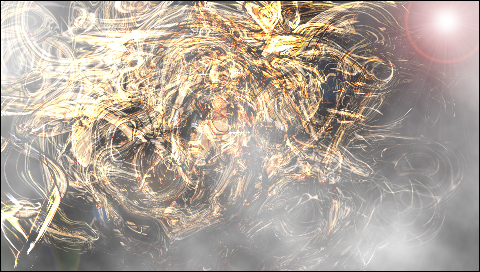So. I started up in an RPG today, and I realized that I had to create a language for my character. Anyways. The details of this language will follow soon. But first, a bit of a background: The language was created by Vasilis Etikas (My character) when he reached a revelation in his life. A divine figure visited him in the night, and told him that he is to start Kameni Diatagi (Greek for Lost Order), and lead his people to freedom.
Kameni Diatagi is a guild of pacifistic magicians, which is why they speak this language, along with the language of the time: This language is what allows them to do magic, such as the (crappy) language in Eragon. What follows are the details:ENKIDetails: Magical language. Created by founder of Kameni Diatagi, Vasilis EthikasOverview:ALPHABETNOTE: Uppercase letters are the sound in the language.Letter English EquivalentA sAwB ByeCH/K chiCKD meDicalDH myTHE sEEG maGazineGH/J JohnI whYM MeN NoO OpenP PyroR moReT TanU mOOnV diVeZ hiSCHT hitCH ToWord order: V-O-S (VERB OBJECT SUBJECT)Example: Zetoz Votaji vogh Ghapogh = I see my big father (Literally: I POSSESSIVE see Father ACCUSATIVE Large)Case of a word is determined by an affix.Cases: Nominative, Accusative, Dative, Genitive, and LocativeNominative: Main object; Subject.Accusative: Direct objectDative: Indirect object (Rarely used.)Genitive: Possession (Rarely used.)Locative: Showing location (Rarely used. Prepositions more prominent.)The language is rather Agglutinative, so to speak. Whole sentences are made into a word based upon how you like to read the sentence. Agglutination or not is up to the writer.__VERBS__End in -kiReplace -ki with conjugation.Conjugated as following:EX. VERB: Enki - To Be Past Present Future1st -zar -toz -kim2nd -ko -chit -tur3rd -baz -zorg -zim1st Pl. -azar -chtoz -chtim2nd Pl. -chto -chito -chtur3rd Pl. -abaz -chtorg -zimchGerund: Formed by removing -ki and adding -ghikiThe past tense can also be formed using two other methods: Past Perfect, or Past Indicative.Past perfect: Conjugated form of Miki + 3rd Pl. present Conjugation of verb (Mitoz Enchtorg = I was (neglecting pronouns))Past Indicative: Kavka + present conjugation (Kavka Entoz : I was.)Future tense can also be formed with the addition of Ki before modfied verb (Ki Entoz = I will be/I will have been.)Negative modifier: Ni ( Ni Entoz = I am not.)Auxillaries: Sanki = To be able to, Dertoki = To have to, Moktiki = To like, Zaki = To want, Enki = To bePRONOUNSGha - IGovocht - YouEnk - HeKe - SheDazu - ItVocht - WeTekto - You PLURALKanei - TheyGigh - One (Impersonal pronoun)Dhiti - ThatKichtka - ThisInterrogativesKidh - WhoGhaza - WhatVijan - WhenKovar - WhereChtinv - WhyChoen - HowOchiti - AndObos - But…/On the contrary…/However…Zav - OrVink - When (Referring to a single event)Akta … Zor Na - As soon as …To form the accusative form, add -chti to end, Dative: -zichtNOUNSPluralization: Add -mogh to end of noun.Accusative: -ajiDative: -detGenitive: -kal (Menaji Tiokal = The men of war)Locative: Formed using prepositionsAdjectivesFollow same rules as nouns, if a noun is modified via an affix, said affix is also on adjective.To form an adverb, add -chtoni to the end.To form opposite of an adjective, add -te to the end.Comparitive forms:-jin : Minor comparitive-amigh - Superlative comparitiveDhak - ThanWordlistPrepositionsGhoch - OutDerzet - BesidesNor - ByChton - WithAvazit - AfterZichir - SinceChtezi - OfKokta - ToOndh - UntilDorizi - ThroughZo - ForGhig - AgainstZont - WithoutAzonti - AroundKa - AtDhagh - OnVint - BehindChar - InZende - Next (to)Oz - OverKuras - UnderChorat - BeforeDhinur - BetweenZilt - StillVadato - AgainVerbsEnki - To beSAnki - To be able toDertoki - To have toMoktiki - To likeZaki - To wantMiki - To haveMaghki - To summonKoriki - To controlZariki - To sitVoloki - To envelopePerturiki - To plagueKaviki - To playKizoki - To hateGharoki - To loveVuki - To wishZenaki - To destroyAschtiki - To eradicateZanghki - To singDhaziki - To reciteVoloriki - To followOboneki - To possessVeroki - To researchKa Peruski - To look atZordhiki - To purchasePanki - To sellDhuniki - To doDhraziki - To praiseMaghtiki - To (do) MagicKamviki - To battleDhrinki - To drinkBidetiki - To BuildSchtaki - To strikeAtoriki - To AttackKa Schariki - To slash atSiniki - To sinDharoski - To thinkZeki - To seeKa Zeki - To look atSakorki - To speakNOUNSVam - TreeVodhir - WaterDras - RockChtorgin - AirVichar - FireNazor - NatureChrondh - GroundMaghti - MagicMaghtiker - MageKamviker - WarriorMondh - MoonZanor - SunZuteru - StarChutuchtu - GodDesor - SwordDesorer - KnightGzor - Group, FactionOrginiti - OrganaLunositi - Knights of LunosDorniti - DornaAtoma - DirtBidetiker - BuilderBeghini - FundamentZanti - SonVot - FatherDochti - DaughterMot - MotherVoghivot - GrandfatherVoghimot - GrandmotherChanikos - ParentGhakvo - LiquidZarak - LanguageADJECTIVESVogh - BigGhoj - Good Paroti - RighteousVatir - VeryDarekt - WetGhonikir - LongGotin - LooseGhort - HotTati - TallIton - YoungSutu - StraightDenaz - FastRANDOM WORDS/PHRASESMartoz Govocht ghoj zo Gha - Pleasure to meet you (Literally: I meet you for good.)Zagh! - Hello!Indhi - YesNi - NoVaduz! - Good bye!I doubt many people are going to read this, but if you do, I'd like to see what you have to think. I know that the language has a lot of weird pronunciation issues, but it's somewhat like Enochian: A magic language that is a bit hard to pronounce in many cases. But, in any case, this is it.Also, note that this is far from done.
Ya, I never listened in G1-3 because I hadn't learned how to cope with my ADD. Hence, my troubles are in present tense.
hmmm….. well good luck with it =)